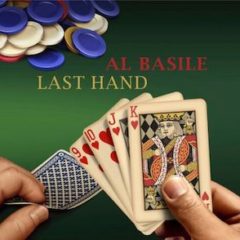
Al Basile: Last Hand is the winning hand…
By David McGee

LAST HAND
Al Basile
Sweetspot Records
Al Basile is an artist whose recording projects are as much literary as musical events. A regular presence in the top 20 of the Living Blues chart and an eight-time BMA nominee as Best Horn Player, Basile is also the first student to receive a Master’s Degree from Brown University’s writing program; as a published poet, he’s represented with two collections of his verse, continues to be published in various poetry journals and for the past three years has taught lyric writing, performed poetry and led panels at poetry conferences.
True to this background, as he always is, Basile returns with one of his most ambitious album projects in Last Hand. No random collection of tunes, Last Hand is, in essence, the cast album of a play Basile created to tell the story of a May-to-December affair between an older man and a younger woman. A timeless topic, this, with Basile presenting the story from the man’s point of view, beginning even before the beginning in the first song, “It Ain’t Broke,” painting a lyrical portrait of a man of a certain age confident of his prowess in making things right in the world: “If you need a fixer, I’m your guy/if you heard me say it, it’s no lie/I ain’t laughin’ ‘cause it’s no joke/if I can’t fix it, it ain’t broke.” By the second tune, “Invisible Man,” reality is hitting him square on, when “the fixer” has his experience of Springsteen’s “Girls In Their Summer Clothes” moment–“Women walk by me and don’t even look/I might just as well go smile at a book.”—and in an instant the self-confident character of “It Ain’t Broke” is shaken, so much so as to make him quite skeptical, in “Don’t Toy With Me,” of a younger woman’s admiring glances. He battles with his feeling as the song unfolds, each verse tempering a tingle with a chill until, at the end, he muses, “There’s no use pretending you want any more/You know I’ve been through all of this before/Must be a reason that I can’t see/Just can’t believe you’re talking to me.” Between the end of “Don’t Toy With Me” and the start of the cool, gently swinging “What Would You Be Doing,” she’s made clear her intent to engage him in an emotional investment paying romantic dividends, leaving him still in doubt down deep—“Now what would you be doing with a beat-up man like me?” and “Why would you want be wanting to be seen around the town/and have to watch the old men grin/and all the women frown” are his existential queries–but taking the fateful step of buying in: “I’ll believe you baby, and take you at your word/You say you want me anyway, no matter what you’ve heard.”

‘It Ain’t Broke,’ Al Basile, the album opening track on Last Hand

‘I Could Get Used to This,’ Al Basile, from Last Hand
Thus end the first “scene,” and the rest of the tale unfolds over eight songs, ending predictably but not so predictably in its evolution, thanks to Basile telling the tale through the man’s interior monologues. Last Hand is essentially a chamber play, understated, intimate and introspective. To that end, Basile’s personable voice draws the listener into his confidence by its conversational quality—having limited range is something Basile has turned into a strength throughout his career, but it’s especially affecting in the storytelling mode he adopts on Last Hand. An aggrieved but reconciled plaintiff, he lays out what is really a case against himself with bracing self-awareness while at the same time not disguising feelings of jealousy, self-pity and lingering pain, no matter the ending always being a fait accompli, in, respectively, the gritty blues of “Has He Got a Name?”, the boozy, after-hours groove of “The Problem is Me” and the saloon-style ambience of the seething closing meditation, the tellingly titled “Time Heals Nothing.” As a first-time producer, too, he’s made all the right moves in assembling a tight, empathetic trio of musicians he knows well to support the plot with a spare, evocative but restrained soundscape. Their names will be familiar to anyone who’s followed Basile since his days as the first trumpet player in Roomful of Blues or over the course of the solo career he launched in 1998: Bruce Bears on piano and organ, Brad Hallen on electric bass and Mark Teixeira on drums. Basile limits his cornet work to two numbers only: a keening, lonely solo near the end of “Don’t,” over cool bass and brush drums; and more piercing, broken-hearted melodies at the outset and conclusion of “Time Heals Nothing.” Hallen and Teixeira comprise a wonderful rhythm section, their collaboration subtly driving the grooves sotto voce, if you will, underpinning the narratives with cool sensuality, unsettling heat or carefree strut as the narrative requires. Which leaves a huge opening for Bears as a complementary keyboard voice to Basile’s vocals, and he not only meets the challenge beautifully, but, in a tour de force, illustrates how an instrumentalist deeply in tune with a vocalist can enhance and even expand the story’s dramatic emotional turns with a few well-chosen flourishes adding blues, jazz and pop elements to the sonics.

‘Back at the Restaurant (scene),’ one of the tracks from the expanded Last Hand 2.0, Al Basile

‘Time Heals Nothing,’ Al Basile, the final track from Last Hand
Since this is intended as a play, I’ve resisted detailing every aspect of how the story unfolds, but from the titles alone the careful reader can get the drift of how it ends. Which is pretty much how all these type stories end, with the added frisson being the older man’s sense of time running out, not only on the relationship but on his own life, his “last hand,” as he explains most dramatically in the false bravado animating “After I’m Gone” and in the flash of anger he allows himself in a slow-burn moment in “Time Heals Nothing” at album’s end. Those who find the scenes shifting too abruptly are advised to investigate an expanded version, titled Last Hand 2.0, that adds 11 more “scenes”—mostly exposition, some all dialogue—to the dozen tracks on Last Hand (with titles such as “After the Afternoon Set,” “Driving to the Shore,” “In the Bedroom,” “At Breakfast,” et al.). Any way you cut it, Last Hand is another remarkable achievement in a career boasting more than a few such distinctions.


